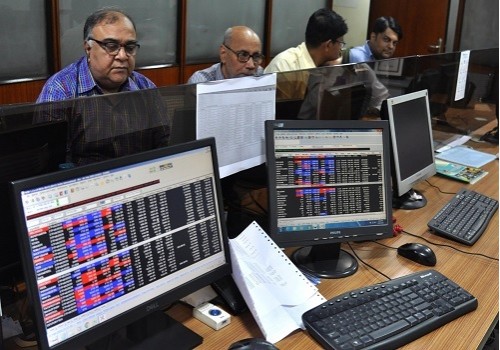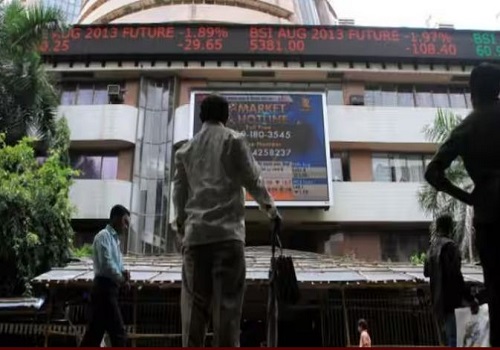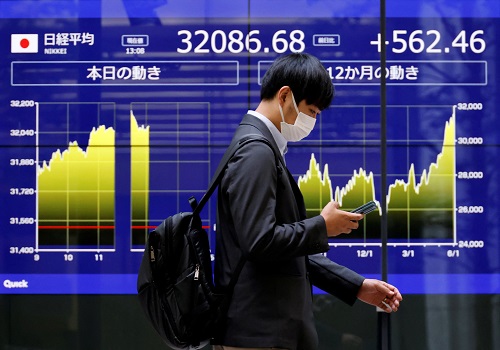Opening Bell : Markets likely to get negative start on Tuesday

Follow us Now on Telegram ! Get daily 10 - 12 important updates on Business, Finance and Investment. Join our Telegram Channel
Indian markets ended higher for a third consecutive session on Monday amid hopes that major central banks have reached the end of their historic rate-hike cycle. Today, markets are likely to get negative start due to consolidation phase after three days of consistent buying. Also, weakness in Asian counterparts may dampen sentiments. Investors are awaiting China's trade data as well as Q2 earnings from India Inc. for more directional cues. That apart, they will also track voting trends in Mizoram and Chhattisgarh for Assembly elections. Foreign fund outflows likely to dent domestic sentiments. According to the provisional data available on the NSE, foreign institutional investors (FII) offloaded shares worth net Rs 549.37 crore on November 6, 2023. However, some respite may come later in the day as credit rating agency Fitch ratings in its latest Global Economic Outlook report said the Indian economy has the potential to clock 6.2 per cent annual average growth rate in the medium term during the 2019-27 period. The agency raised the projection by 0.7 percentage points from 5.7 per cent estimated for 2013-2022, primarily due to improved employment rate and better working-age population forecast. Traders may take note of Union Finance Minister Nirmala Sitharaman’s statement that India’s G20 presidency had provided a clear policy direction to address the needs of the majority of the global population whose voices were often unheard in multilateral forums. Meanwhile, the government is likely to hold a series of meetings in November to review, and streamline processes in indirect taxation, including the Goods and Services Tax (GST). Auto stocks will be in focus as data shared by the Federation of Automobile Dealers Associations (FADA) showed that during October this year, total sales of 2.12 million units were recorded compared to 2.29 million units during October 2022. On the other hand, three-wheeler (3W) sales were up by 46 per cent, commercial vehicles by 10.3 per cent, and tractors by 6.2 per cent during the period under review. There will be some reaction in insurance industry stocks as the data shared by the General Insurance Council showed that the monthly premiums of non-life insurance companies grew by 13.65 per cent in October this year to Rs 23,814.64 crore, up from Rs 20,954.89 crore in the same period last year, aided by healthy growth across segments. However, the public sector general insurance companies printed a 3.62 per cent de-growth across the time period. Meanwhile, Mamaearth will list on bourses today. The IPO price was fixed at Rs 324 per share.
The US markets ended higher on Monday as investors awaited guidance from a host of Federal Reserve policymakers later in the week on the central bank's policy path. Asian markets are trading mostly in red on Tuesday ahead of trade data coming out of China, as well as a rate decision by the Reserve Bank of Australia.
Back home, Indian equity benchmarks ended higher for the third consecutive session on Monday driven by gains in Capital Goods, Metal and Industrials shares amid favourable trends in global markets. The broader indices also traded in tandem and rose in the range of 0.9%-1%. Markets made a gap-up start and stayed in green for whole day as sentiments got a boost with a survey by prominent economic think-tank NCAER showing that an all-round improvement in business sentiments in the second quarter of the current fiscal. The Business Confidence Index (BCI) rose from 128 in the first quarter of the current fiscal to 140.7 in the second. Besides, reiterating India's commitment to embracing disruptive technologies, particularly AI, Union Minister of Commerce & Industry, Piyush Goyal has said that Artificial Intelligence (AI) is a powerful tool to fight poverty, deliver goods and services to remote areas, and reskill the workforce for the future. Key indices extended gains in second half of trading session and closed near day’s high points, taking support from the Reserve Bank of India’s statement that India’s foreign exchange reserves increased by $2.579 billion to $586.111 billion in the week ended on October 27. In the previous reporting week, the overall reserves had dropped by $2.363 billion to $583.532 billion. Traders also took a note of report that steps such as curbs on inbound shipments of certain goods, production linked incentive scheme and mandatory quality norms are helping the country reduce imports of non-essential products such as TV, tyres, wallpaper and AC gas compressors. According to an analysis of the commerce and industry ministry, import restrictions imposed on tyres helped cut the inbound shipments by 74 per cent to $74 million in 2022-23 from $276 million in 2019-20. Finally, the BSE Sensex rose 594.91 points or 0.92% to 64,958.69 and the CNX Nifty was up by 181.15 points or 0.94% to 19,411.75.
Above views are of the author and not of the website kindly read disclaimer










Tag News

Daily Market Commentary : Nifty ended marginally higher at 23,813 (+0.3%), amid subdued volu...



More News

Futures to the tune of 720 Cr - Axis Securities Ltd





 320-x-100_uti_gold.jpg" alt="Advertisement">
320-x-100_uti_gold.jpg" alt="Advertisement">




